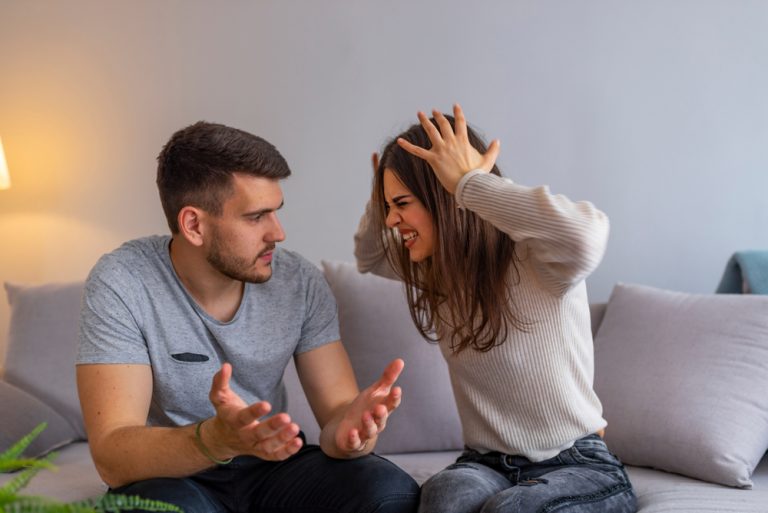
Anxiety is not easy to live with, not for the person experiencing it on a daily basis nor for their life partner. It requires a lot of patience, understanding and support. But if you truly love your partner, it’s the least you could do for them. That being said, here are 8 ways you can show support and help your anxious partner go through and even move on from this difficult condition.
A difficult test for your relationship
Supporting a partner who suffers from anxiety can be tough. There are certain barriers each of you will probably put up, communication mishaps and misunderstandings, stress and an overall strain on your relationship. According to the Anxiety and Depression Association of America (ADAA), people with generalized anxiety disorder (GAD) were twice more prone to experience relationship problems and three times more likely to avoid intimacy whatsoever. It’s not only the relationship that takes a hit; anxiety problems can also reflect in one’s financial situation, professional life and social life. You could also start experiencing anxiety and depression, not only your partner.
There are various treatments that could help people with anxiety, but a supportive partner can help in more ways than one. Here’s what you can do to support your partner with anxiety.
RELATED: 5 Ways Depression Can Secretly Ruin Your Life

Acknowledge that anxiety is common
In fact, anxiety is the most common form of mental disorder in the United States, affecting around 30 percent of adults to one degree or another sometime throughout their lives. According to the National Institute of Mental Health (NIMH), in the past year alone, one in five American adults experienced some sort of anxiety disorder, either panic disorder, generalized anxiety disorder or post-traumatic stress disorder—PTSD. In specific numbers, this means 62 million people, excluding the ones with anxiety or stress caused by everyday situations like an important deadline, a major family event or a breakup. When it prevents someone from having a normal life, that’s when the anxiety turns into a disorder.
However, not all anxiety is created equal in that sometimes, it can be helpful, according to extensive research conducted by the Greater Good Science Center at the University of California, Berkeley. It won’t make your partner’s pain disappear, especially if they suffer from chronic anxiety, but it will make them see they are not fighting this battle alone.
See also Can COVID-19 Cause Seasonal Affective Disorder? Experts Weigh In
Give up short-term comfort for longer-term benefits
In many cases. people with anxiety either try to control it or nip it in the bud; unfortunately, this opens the door to avoidance patterns, according to Jonny Gerkin, MD, associate professor of psychiatry at the University of North Carolina School of Medicine in Chapel Hill.
But avoiding the things, people or places that make your partner extremely anxious is not going to benefit your partner’s mental health in the long term. Your first instinct may be to soothe and keep your partner away from whatever causes them distress. “It feels very compassionate, but it perpetuates a lot of the difficulties,” warns Dr. Gerkin. Instead of keeping up with the avoidance behavior, support your loved one while they are facing their fears and anxieties. Talk to your partner to find out what they would be doing if their anxiety wouldn’t overwhelm them, suggests Gerkin.
Accept what you don’t know
Anxiety comes in different forms and types. There’s GAD, panic disorder, PTSD, obsessive-compulsive disorder (OCD), various phobias like fear of spiders, of going outside, of heights and separation anxiety disorder. That’s just a few of them, each with their very own warning signs and symptoms, which, to make matters even more complicated, can differ from one person to another.
If you find it difficult to understand what your significant other is enduring on a daily basis, talk frankly and admit there are things you don’t know and understand, suggests the ADAA. According to Beverly B. Palmer, PhD, professor emeritus of psychology at California State University, Dominguez Hills and author of Love Demystified: Strategies for a Successful Love Life, “the first step in trying to help is to become aware”. So, do just that! Become aware.

Allow your partner to “own” the anxiety
If your partner struggles with anxiety, it’s extremely important for them to recognize the signs and understand what they feel, instead of waiting for you or someone else to recognize the anxiety for them and ring the alarm. This doesn’t mean that you cannot break the ice and set the awareness process in motion. One way to do that us by paying attention and reading your partner’s body language. “At the beginning, give a description of what you’re noticing in your partner with no adjectives,” Palmer explains. tell them what you see, for example that their body is tensing up or that their eyes are twitching. It will allow them to become more aware of their body and give them internal control over their condition.
Make sure you also read 19 Expert-Recommended Ways to Be a More Thoughtful and Proactive Partner.
Ask your partner to describe what they feel
Engaging your partner in a conversation about what they feel and experience might actually divert them from their painful emotions. Asking them questions will influence and put their cortex to work (the part of the brain that governs reasoning and thoughts).
“It is using the executive control network to downregulate the fight-or-flight response,” says Dr. Gerkin. Reassure your partner that these feelings are temporary and that they will get over them. “You can re-engage in the present as best you can. You’re changing the function of the anxiety feelings from ‘It’s time to hide’ to ‘It’s time to take action,” explains Gerkin. When your partner describes their emotions, ask them what you can do to help them, suggests the ADAA.

Become workout buddies
Believe or not, one of the most effective ways to alleviate anxiety symptoms is exercise. “We have a substantial body of literature that shows physical exercise really is preventive in anxiety conditions,” says Palmer. In an article published in 2017 in Psychiatry Research, researchers concluded that exercise is a natural way to decrease sensitivity to the body’s reaction to anxiety, ease symptoms of depression and make you feel better in general. This only strengthens the idea that if your body is healthy and feels better, so does your mind.
Therefore, help your partner exercise more by motivating them and becoming their workout buddy. Physical activity is beneficial for everyone, so, you’ll also benefit from it. Whether you opt to go to the gym together, go for a walk, ride your bikes or exercise at home, the important things is to help each other out. As a minimum, the Centers for Disease Control and Prevention recommends 150 minutes of physical activity per week. Find inspiration from these 4 Ways to Improve Your Mental Health Through Exercise.
Meditate together
Apart from becoming your partner’s workout buddy and exercising together, you can also turn into your partner’s meditation buddy. Meditation or mindfulness can be very helpful for people with or without an anxiety disorder. You and your partner can practice breathing techniques and meditations together and hold each other accountable. “Your breath is your friend,” says Palmer. “It is so important to take a deep, slow breath in and letting it out just slowly; do that up to three times and it relaxes your body”.
Your mind will follow your body. One 2016 study revealed that 13 minutes of meditation on a daily basis for two months significantly improved mood and cognitive functions such as memory and attention. These 4 Super Relaxing Exercises might help both of you to relieve stress and cope with anxiety better. Also, if you want to mediate in the comfort of your own home, discover 6 Secrets to a Blissful DIY Meditation Room.



















































